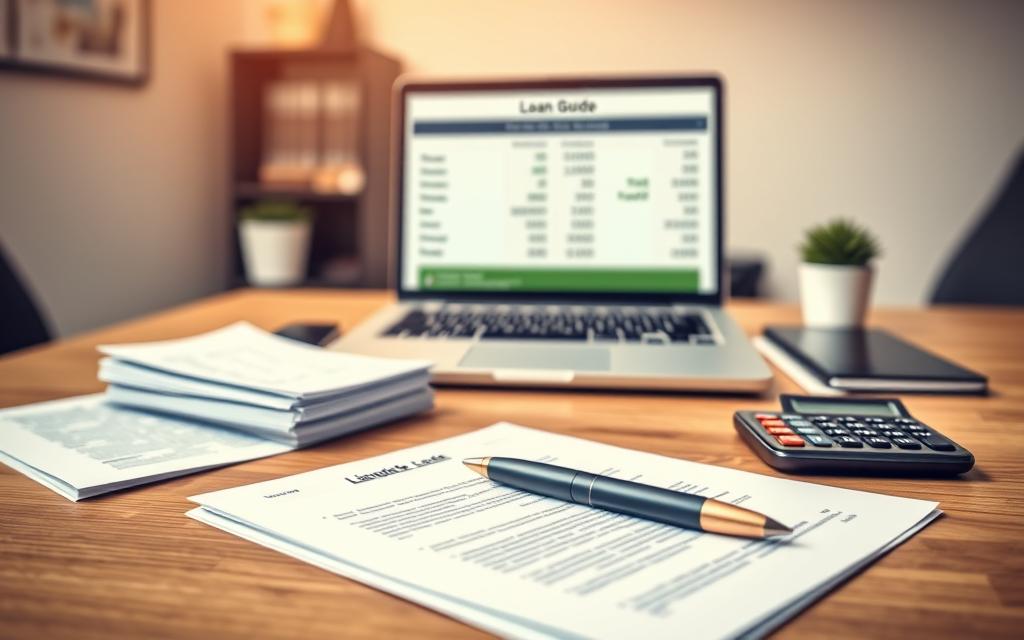Advertisement
Did you know that over 27 million Americans took out a personal loan in 2022?
This number shows how many people are turning to loans for help. If you’re thinking about a loan to cover unexpected expenses or consolidate debt, you’re in good company.
With so many loan options, it’s crucial to think carefully about your choice. We’ll help you understand what to consider when deciding on a loan. You’ll get important loan tips to help you make a smart choice.
Knowing the good and bad points will help you decide if a loan is right for you.
Understanding Personal Loans
Exploring personal finance often means learning about personal loans. These loans are flexible and can fit many financial needs. We’ll cover the basics of personal loans, including what they are, how they work, and their uses.
What Is a Personal Loan?
A personal loan is a type of loan that you can get from banks, credit unions, or online lenders. It’s different from secured loans because you don’t need to put up collateral. Expert personal loan advice can guide you through the details of personal loans.

How Do Personal Loans Work?
Personal loans give you a sum of money to pay back over time. You usually agree on fixed interest rates and monthly payments. The process involves applying, a credit check, and agreeing on terms with the lender. Knowing how personal loans work helps you manage your money better.
Common Uses for Personal Loans
Personal loans are useful for many things, like paying off debt, improving your home, or covering unexpected costs. A good personal loan guide will help you see how these uses fit your financial plans.
Learning about personal loans helps you make better financial choices. Whether you need to pay off debt or buy something big, personal loans can help.
Types of Personal Loans
Personal loans come in many forms, each for different needs. Knowing these differences helps you choose the right loan for you.
Secured vs. Unsecured Loans
Secured and unsecured loans are two main types. Unsecured loans don’t need collateral, making them easier to get. But, they often have higher interest rates because lenders take more risk.
Secured loans, on the other hand, use assets like cars or savings as collateral. They might have better rates but risk losing the asset if payments are missed.
Fixed vs. Variable Interest Rates
Interest rates are another key factor. Fixed interest rates stay the same, making payments predictable. Variable interest rates can change with the market, possibly lowering payments if rates go down. But, payments could also increase if rates rise.
Debt Consolidation vs. Home Improvement
Personal loans serve various purposes. Debt consolidation loans merge multiple debts into one, often with a lower rate and simpler payments. Home improvement loans fund renovations or repairs, potentially boosting your home’s value.
- Debt consolidation can simplify your finances and save on interest.
- Home improvement loans can improve your living space and increase your home’s value.
Understanding personal loan types and their uses helps you make a better choice. This choice should match your financial goals and situation.
Evaluating Your Financial Situation
Before you start looking into personal loans, take a moment to check your finances. This step is key to see if you can handle the loan payments. It also helps decide if a personal loan fits your financial needs.
Assessing Your Credit Score
Your credit score is very important. It affects the interest rate you get and if you qualify for a loan. A good credit score can save you money by getting you lower interest rates. You can check your score on Credit Karma or through Equifax, Experian, and TransUnion.
Make sure to review your credit report for mistakes. If you find errors, dispute them. A better credit score means you might get approved for a loan and get better interest rates.
Determining Your Debt-to-Income Ratio
Your debt-to-income (DTI) ratio is also important to lenders. It’s your total monthly debt payments divided by your income. A lower DTI ratio means you’re in better financial shape.
- List all your monthly debt payments, including credit cards, car loans, and other debts.
- Calculate your gross income before taxes.
- Divide your total debt payments by your gross income to get your DTI ratio.
Lenders like a DTI ratio of 36% or less. If yours is higher, you might need to pay off some debt before applying for a loan.
Creating a Personal Budget
Creating a budget helps you see where your money goes. It shows if you can afford loan payments. Start by tracking your income and expenses to find ways to save.
- List all sources of income.
- Track your monthly expenses, including necessities like rent, utilities, and groceries.
- Identify discretionary spending that you can reduce or eliminate.
With a realistic budget, you can decide if a personal loan is right for you. Make adjustments as needed to fit the loan payments.
Checking your finances well before applying for a personal loan can prevent financial trouble. By looking at your credit score, DTI ratio, and making a budget, you’ll know if a personal loan is a good choice for you.
When a Personal Loan Makes Sense
Knowing when to get a personal loan is key to staying financially stable. Personal loans can be very helpful when used right. They help with unexpected bills, big purchases, or combining debts.
Emergency Expenses
Many people get personal loans for emergency costs. Things like medical bills, car fixes, or sudden home repairs can hit hard. A personal loan can help cover these costs quickly, keeping you financially safe.
Major Purchases
Personal loans are also good for big, non-urgent buys. This includes wedding costs, home makeovers, or big events. They offer a clear payment plan, easing the financial burden.
Consolidating Higher-Interest Debt
Another smart use of personal loans is for debt consolidation. If you have debts with high interest, like credit cards, combining them into one loan can save money. This can lower your monthly payments and interest costs.
| Debt Type | Interest Rate | Monthly Payment |
|---|---|---|
| Credit Card | 20% | $500 |
| Personal Loan | 10% | $300 |
Consolidating debt into a personal loan can cut your monthly payments and interest. It’s wise to think about your finances and seek advice before making a decision. This ensures you’re making the best choice for your situation.
In summary, personal loans can be a smart choice when used wisely. Understanding when and how to use them can help you achieve your financial goals and stability.
Comparing Lenders
Finding the best personal loan deal means comparing lenders carefully. There are many options, so it’s key to research well. This ensures you get a loan that fits your financial needs.
Interest Rates and Fees
When comparing lenders, interest rates are crucial. A lower rate can save you money. But, don’t forget to check for fees like origination fees and late payment fees.
Some lenders might have good rates but high fees. This can make the loan more expensive. So, always look at the total cost of the loan to compare accurately.
Loan Terms and Conditions
Loan terms and conditions are also important. Look at the repayment period and if you can change it. Also, check for any special conditions, like insurance or collateral needs.
- See if the lender offers flexible repayment plans that fit your budget.
- Find out about prepayment rules. Some lenders charge for early repayment, while others don’t.
Customer Reviews and Reputation
The lender’s reputation matters a lot. Look for positive reviews and a history of reliable service. Check online reviews to see what other borrowers say.
Also, consider the lender’s customer service. Good customer service can help if you have loan issues.
By looking at these factors, you can choose the best personal loan for you. These best personal loan tips will help you find a loan that matches your financial goals and situation.
The Benefits of Personal Loans
Personal loans offer many benefits, like flexibility and tax perks. They can be a great financial tool if used right. They can help improve your financial health in several ways.
Flexibility and Accessibility
Personal loans are very flexible. They’re not like mortgages or car loans, which have specific uses. You can use them for many things, like paying off debt or buying something big. This makes them a good choice for many financial needs.
Key Features of Personal Loan Flexibility:
- Can be used for multiple purposes
- No collateral required for most loans
- Quick access to funds when needed
Potential Tax Benefits
Personal loans might also save you on taxes. For example, if you use a loan for home improvements, you might get to deduct the interest. But, always talk to a tax expert to know how your loan affects your taxes.
Building Credit Through Borrowing
Personal loans can also help improve your credit score. By getting a loan and paying it back on time, you show lenders you’re reliable. This is great for people trying to build or fix their credit.
| Benefits | Description | Impact |
|---|---|---|
| Flexibility | Can be used for various purposes | Enhances financial management |
| Potential Tax Benefits | Interest may be deductible under certain conditions | Reduces taxable income |
| Building Credit | Timely repayments improve credit score | Increases creditworthiness |
Knowing the benefits of personal loans helps you make better financial choices. They can help with debt, big purchases, or even building your credit. Personal loans are a valuable tool for your financial health.
The Risks of Personal Loans
Personal loans can be a big help, but they also have risks. It’s important to know these risks before deciding if a personal loan is right for you.
High Interest Rates
One big risk is high interest rates. These rates can change a lot based on your credit score, how long you’ll take to pay back, and who you borrow from. If you have a lower credit score, you might get a loan with a higher interest rate. This makes the loan more costly over time.
To avoid this, look for different lenders and compare their rates. Even a small difference in rates can save you a lot of money over the loan’s life.
Loan Terms and Traps
Another risk is the loan’s terms and conditions. Some lenders might include clauses that aren’t good for you, like prepayment penalties or fees for starting the loan. Always read the fine print and understand everything before you sign.
- Prepayment penalties for paying off the loan early
- Origination fees that reduce the loan amount
- Hidden charges that increase the total cost
The Impact on Your Credit Score
Personal loans can affect your credit score in different ways. Missing payments or defaulting can lower your score a lot. But, making payments on time can help improve it.
| Credit Score Impact | Positive Impact | Negative Impact |
|---|---|---|
| Payment History | Timely payments improve credit score | Missed payments lower credit score |
| Credit Utilization | Lower credit utilization ratio | Higher credit utilization ratio |
Knowing the risks of personal loans helps you make better choices. It’s wise to talk to a financial advisor if you’re not sure about taking out a loan.
Questions to Ask Before Obtaining a Loan
Before getting a personal loan, it’s key to ask important questions. Knowing the loan’s terms can help avoid financial trouble later on.
What Is the Total Cost of the Loan?
It’s crucial to know the loan’s total cost. This includes the principal, interest rate, and any extra fees. The Annual Percentage Rate (APR) shows the loan’s total cost. Here’s how to figure it out:
| Loan Amount | Interest Rate | Loan Term | Total Cost |
|---|---|---|---|
| $10,000 | 6% | 5 years | $11,322 |
This table shows how the total cost is figured over time. It helps you understand what to expect.
What Happens If I Can’t Repay?
It’s important to know what happens if you can’t repay. Not paying back a loan can hurt your credit score and lead to legal trouble. Find out your lender’s rules on late payments and default.
- Late payment fees
- Impact on credit score
- Potential legal action
Are There Prepayment Penalties?
Some loans have prepayment penalties for early payment. Always ask about these penalties before you sign. Knowing this can help you decide if paying off early is a good idea.
By asking these questions, you can make a better choice about getting a personal loan. Always read the loan terms carefully. If you’re unsure, consider getting advice.
Tips for Getting the Best Personal Loan
To find the best personal loan, it’s smart to shop around and compare different lenders. This way, you can pick the loan that fits your financial needs and goals.
Shop Around for Rates
Comparing rates from various lenders is a great way to save money. It can lower your interest payments and monthly costs. Use online tools or talk to several lenders to find the best rates.
Key Considerations When Comparing Rates:
- Interest Rate: Look for the lowest interest rate available to you.
- Fees: Consider any additional fees associated with the loan.
- Repayment Terms: Evaluate the flexibility of the repayment terms.
Consider Credit Unions and Online Lenders
Credit unions and online lenders often have better rates and terms than traditional banks. Credit unions, being non-profit, might offer lower rates and better service. Online lenders provide quick applications and fast funding.
| Lender Type | Interest Rate | Fees | Repayment Terms |
|---|---|---|---|
| Traditional Banks | 6% – 12% | Origination, Late Fees | Fixed, 3-5 years |
| Credit Unions | 5% – 10% | Lower or No Fees | Flexible, 3-5 years |
| Online Lenders | 6% – 15% | Origination Fees | Variable, 3-5 years |
Look for Prequalification Options
Prequalification lets you check if you qualify for a loan without hurting your credit score. It shows you the loan amount and rate you might get. This helps you make a better choice.
By following these tips, you can find a great personal loan. Remember, being informed and ready is key to getting the best deal.
Alternatives to Personal Loans
Personal loans aren’t the only way to handle financial needs. There are other good options to think about. When you’re facing money troubles or planning big expenses, it’s key to look at all your choices carefully.
Credit Cards
Credit cards can be a handy choice for smaller or urgent expenses. They let you get money fast without a long wait. But, remember the interest rates and fees can add up. Expert personal loan advice recommends looking for cards with 0% intro rates or low ongoing rates.
Home Equity Loans
Homeowners might find home equity loans useful for big costs like fixing up your home. These loans use your home’s value to get money, often at a better rate than personal loans. But, keep in mind, your home is at risk if you can’t pay back the loan.
Peer-to-Peer Lending
Peer-to-peer lending sites connect you with investors directly. This can lead to better rates and terms than banks. When looking at peer-to-peer lending, check the fees, loan terms, and how it might affect your credit score.
In summary, while personal loans are useful, looking at other options like credit cards, home equity loans, and peer-to-peer lending can help you find the best fit. By using personal loan tips and tricks and getting advice from experts, you can choose wisely and meet your financial goals.
Managing Your Loan After Approval
Getting your personal loan approved is just the start. Now, it’s time to think about how you’ll pay it back. Managing your loan well is key to keeping your finances healthy and avoiding trouble.
Creating a Repayment Plan
First, make a solid plan for repaying your loan. Know the loan’s details like the interest rate, how long you’ll pay it off, and your monthly payments. Think about your income, expenses, and other debts you might have.
Key components of a repayment plan include:
- Determining your monthly budget for loan repayment
- Setting up automatic payments to ensure timely payments
- Prioritizing your loan repayment if you have multiple debts
Staying on Top of Payments
To avoid late fees and keep your credit score good, make sure to pay on time. You can set reminders or automate your payments through your bank or loan servicer.
| Payment Method | Benefits | Considerations |
|---|---|---|
| Automatic Payments | Ensures timely payments, reduces risk of late fees | Requires sufficient funds in your account |
| Manual Payments | Offers flexibility, allows for payment adjustments | Requires discipline to make timely payments |
What to Do if You Encounter Difficulties
If money troubles hit and you can’t make payments, act fast. Talk to your lender about options like temporary payment breaks or changing your loan terms.
Remember, talking to your lender is key to finding a solution that works for both parties.
By following these tips and staying proactive, you can manage your personal loan well. This will help you successfully pay it off and keep your finances in good shape.
Final Thoughts on Personal Loans
Deciding if a personal loan is right for you takes careful thought. You need to think about your financial situation, goals, and other options. Knowing the different types of personal loans and evaluating your finances helps you make a smart choice.
Assessing Your Financial Readiness
Before you apply for a personal loan, check your credit score and debt-to-income ratio. This will show if you qualify for a loan and what terms you might get. Getting advice from trusted sources can also help you make a good decision.
Making Informed Decisions
To get the most from a personal loan, compare rates and look at credit unions and online lenders. Using prequalification options can also save you time and money. This way, you find a loan that fits your financial needs.
With good planning and loan management, you can reach your financial goals. Keeping your finances healthy is essential for making the most of a personal loan.



